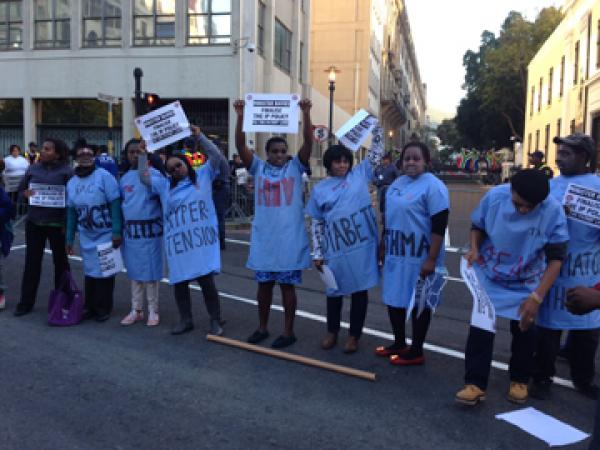Protests at State of the Nation address

Over 50 protesters huddled behind barricades outside parliament on 17 June before President Jacob Zuma arrived to deliver the State of the Nation address that opened South Africa’s fifth parliament.
Ten representatives from the Treatment Action Campaign (TAC) donned blue hospital gowns and zombie makeup to protest parliament’s inability to finalize the nation’s Intellectual Property (IP) Act. Alongside them, in wheelchairs and on crutches, members of the Disabled People of South Africa (DPSA) protested Jacob Zuma’s recent decision to move disability support to the Department of Social Development. The two protests occurred independently, although police ultimately shepherded all protesters into a half-block vicinity.
Names of various diseases were written across the TAC protesters’ gowns to represent the patients who could not afford medicines due to current patent policy.The IP Act has been in development for six years.
“By continuously making obvious, minor modifications to existing medicines, or filing patents for new uses of old medicines, pharmaceutical companies are able to continually extend their 20-year patent monopolies,” a TAC press release explained. “This has led to South Africans paying unnecessarily high prices for a number of medicines because there is no competition from cost-effective generic suppliers.”
The fake-patients walked a “black carpet” to mock the fanfare of the opening of parliament, said Mary-Jane Mastolo, who helped coordinate the event and sported a blue gown that read, “DIABETES.”
According to the TAC, both the African National Congress and the Democratic Alliance expressed strong support for reform of South African patent laws.
While TAC lamented the government’s inaction, DPSA protested the elimination of disabled people from the cabinet’s Ministry for Women, Children, and Disabled People. As of May 24, Zuma announced that the ministry would be limited to women. The protesters argued that the changes only served to reinforce stereotypes about disabled people.

Disabled People of South Africa (DPSA) protesting outside parliament, before the State of the Nation address. Photo by Armand Hough.
“We don’t want to be put into a corner,” said protester Lynette Wyngaard-Rich, a personal assistant at the DPSA.
“They’re used to hiding us,” added Thembinkosi Dyasi, chairperson of the DPSA for the Western Cape. “But we have our own rights. We’re not going to hide.”
DPSA member Vincent Sambatta said their group is explicitly seeking more comprehensive housing, education, and employment opportunities, which they feel can be best met through the formation of an independent ministry.
Sambatta sat defiantly in his wheelchair in front of the barricades lining Plein Street until policemen eventually forced him to relocate.
“When we last came, we came to support our president,” Dyasi said. “Now, we’re here for him to hear our grievances.”
Support independent journalism
Donate using Payfast

Don't miss out on the latest news
We respect your privacy, and promise we won't spam you.
Next: Zimbabwean man sues SAPS
Previous: My brother was my best friend, says sister of slain Ceres man

This article is licensed under a Creative Commons Attribution-NoDerivatives 4.0 International License.
